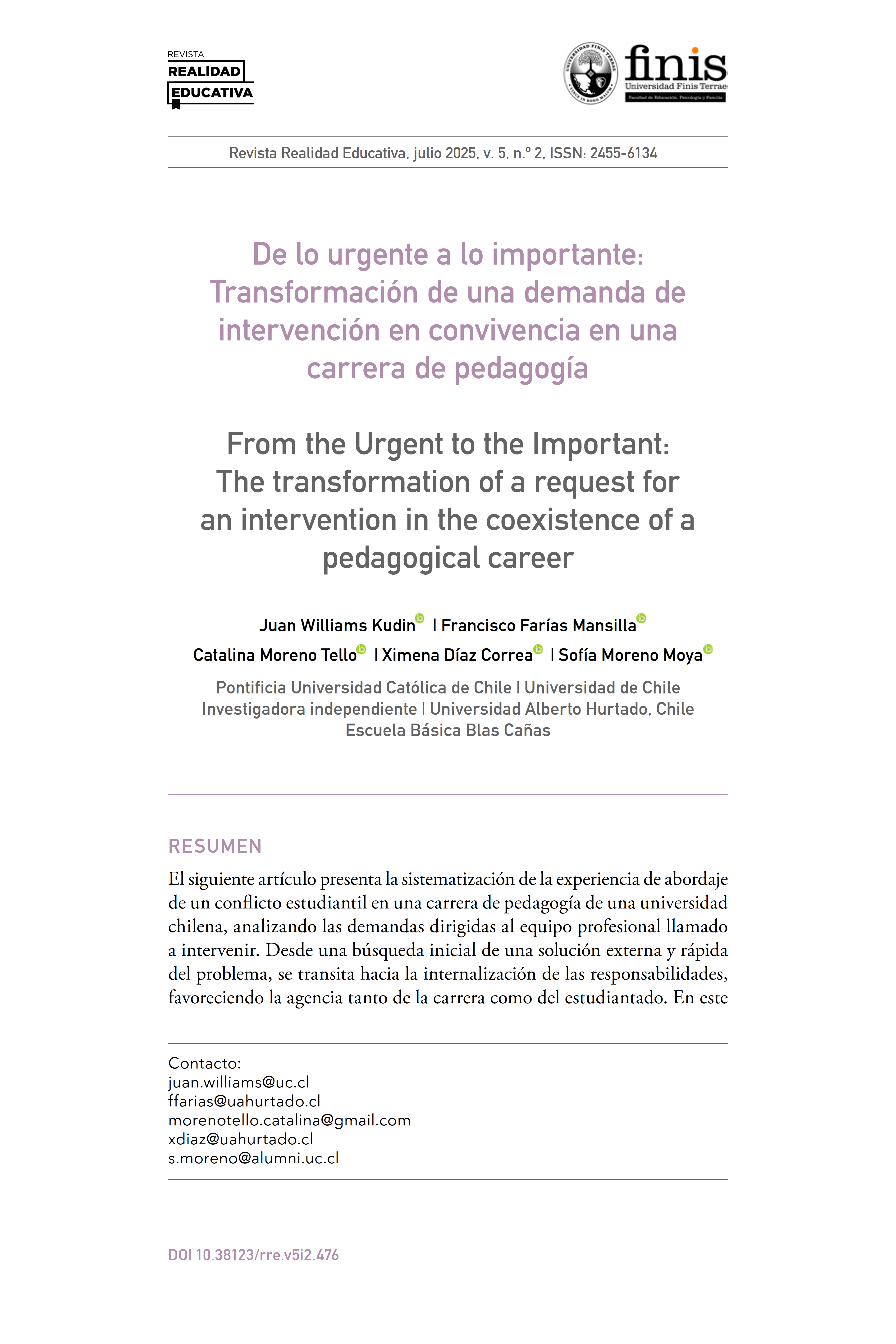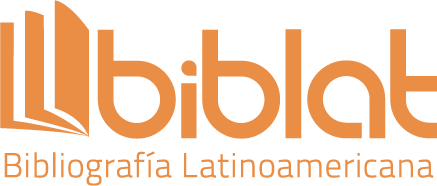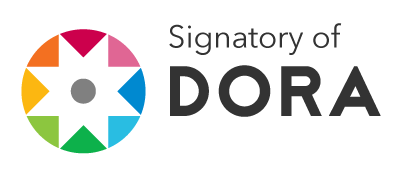From the Urgent to the Important: The transformation of a request for an intervention in the coexistence of a pedagogical career
The transformation of a demand in a Pedagogy Career
DOI:
https://doi.org/10.38123/rre.v5i2.476Keywords:
Conflict transformation, restorative circles, student coexistenceAbstract
The following article presents a systematization of an experience of approaching a student conflict in a pedagogical career in a Chilean university, analyzing the demands made to the professional team called to intervene. From the search for an external and quick solution to the problem, the internalization of responsibility is given way to the internalization of responsibility, favoring the agency of both the career and the students. Within this framework, a training process for co-facilitators of violence prevention circles is implemented, based on the restorative approach, which seeks to explore the problem, generate alternatives and community agreements, and strengthen dialogue tools to address conflicts. As the conflict transforms, so does the demand towards the specialized team, orienting itself towards the accompaniment of new intervention processes that the student body itself seeks to promote, in order to address future situations that may affect university coexistence.
Downloads
References
Agamben, G. (2011) ¿Qué es un dispositivo? Sociológica, 26(73), 249-264.
Araujo, K. (2021). ¿Cómo estudiar la autoridad? Editorial USACH.
Calderón, P. (2009). Teoría de conflictos de Johan Galtung. Revista de Paz y Conflictos, (2), 60-81.
Cattaneo, N. (2018). Conflicto y comunidad: Un camino hacia la construcción de paz. En Nató, Montejo y Negredo (Eds.), Mediación comunitaria. ASTREA.
Chavez-Tafur, J. (2006). Aprender de la experiencia. Una metodología para la sistematización. Asociación ETC Andes / Fundación ILEIA.
Consejo Nacional de Acreditación [CNA] (s/f). Criterios y estándares de la calidad para la acreditación institucional del subsistema universitario . https://www.cnachile.cl/noticias/SiteAssets/Paginas/Forms/AllItems/CyE%20INSTITUCIONAL%20SUBSISTEMA%20UNIVERSITARIO.pdf
Consejo de Rectores de las Universidades Chilenas [CRUCH]. (2022).<> Modelo caleidoscopio: Una propuesta de abordaje de la violencia de género en contexto universitario.
Dellarossa, A. (1979). Grupos de reflexión. Paidós.
Galeas, F. y Hurtado, N. (2020). Justicia restaurativa en una universidad chilena: Sistematización de una experiencia y sus criterios técnicos . Documento de trabajo técnico. Universidad de Chile.
Galtung, J. (1990). La violencia: Cultural, estructural y directa. Journal of Peace Research, 27 (3), 291-305.
González, F. (2002) Análisis institucional y socioanálisis. Tramas, (18-19), 13-50. https://biblat.unam.mx/hevila/TramasMexicoDF/2002/no18-19/2.pdf
González-Ramírez, I. (2024). Harassment Conflicts in Chilean Universities and their Restorative Treatment. Revista de Derecho (Valdivia), 37 (1), 101-122. https://dx.doi.org/10.4067/s0718-09502024000100101
Hernández, M. (2022). Reflexiones sobre feminismos y prácticas de paz en la atención a la violencia de género en ámbitos universitarios. En 2.º Encuentro Universitario Internacional “Hacia una cultura de la paz desde los medios alternos de solución de conflictos”, Universidad de Guanajuato, México.
Hernández, M. (2023). Resolución de conflictos, justicia restaurativa y atención a la violencia de género en ámbitos universitarios . Defensoría de los Derechos Universitarios, Igualdad y Atención de la Violencia de Género y el Instituto de Investigaciones Jurídicas. Universidad Autónoma de México.
Hiner, H. y López, A. (2021). Movimientos feministas y LGBTQ+: De la transición pactada a la revuelta social, 1990-2020. En Gálvez (Ed.), Históricas: Movimientos feministas y de mujeres en Chile, 1850-2020 (pp. 91-127). LOM.
Hurtado, N. (2023). La capacidad de dialogar en el espacio universitario: Conflicto, prácticas restaurativas y feminismos antipunitivistas. En Ibarra y Brito (Ed.), Justicia feminista al borde del tiempo (pp. 205-217). LOM.
Jara, O. (2012). Sistematización de experiencias, investigación y evaluación: Aproximaciones desde tres ángulos. En<> Revista Internacional sobre investigación en educación global y para el desarrollo.
Jara, O. (2018). La sistematización de experiencias: Práctica y teoría para otros mundos políticos. Centro Internacional de Educación y Desarrollo Humano-CINDE.
Karp, D. y Allena, T. (2004). Restorative Justice on The College Campus: Promoting Student Growth and Responsibility, and Reawakening the Spirit of Campus Community. Charles C. Thomas Publisher.
Karp, D. (2015). The Little Book of Restorative Justice for Colleges and Universities . Ed. Good Books.
Karp, D., Shackford-Bradley, J., Wilson, R. y Williamson, K. (2016). Campus Prism: A Report on Promoting Restorative Initiatives for Sexual Misconduct on College Campuses . Skidmore College Project on Restorative Justice. Saratoga Springs, New York.
Lourau, R. (1975). El análisis institucional. Amorrortu.
Manero, R. (1990). Introducción al análisis institucional. Tramas, 1, 121-157.
Nansen Fredssenter for Peace and Dialogue [NFPD]. (2020 ). Manual Nansen para facilitadores de diálogo y transformación de conflictos. Universidad Alberto Hurtado. (Obra original publicada en 2018).
Pranis, K. (2009). Manual para facilitadores de círculos. Comisión Nacional para el Mejoramiento de la Administración de Justicia.
Reyes-Quilodrán, C., LaBrenz, C. A. y Donoso-Morales, G. (2018). Justicia restaurativa en sistemas de justicia penal juvenil comparado: Suecia, Inglaterra, Italia y Chile. Política Criminal, 13(25), 626-649. https://dx.doi.org/10.4067/S0718-33992018000100626
Schmitz, J. (2018). Prácticas restaurativas para la prevención y gestión de conflictos en el ámbito educativo. ProgettoMondo MLAL.
Schmitz, J. (2020). Manual de prácticas restaurativas en el ámbito educativo. Asociación Flamenca de Cooperación al Desarrollo y Asistencia Técnica.
Zehr, H. (2015). The Little Book of Restorative Justice: Revised & Updated . Good Books.

Published
How to Cite
Issue
Section
License
Copyright (c) 2025 Juan Williams Kudin, Francisco Farías Mansilla, Catalina Moreno Tello, Ximena Díaz Correa, Sofía Moreno Moya

This work is licensed under a Creative Commons Attribution-NonCommercial-NoDerivatives 4.0 International License.
Los contenidos de esta revista se distribuyen bajo una licencia Atribución/Reconocimiento-NoComercial-SinDerivados 4.0 Internacional.












